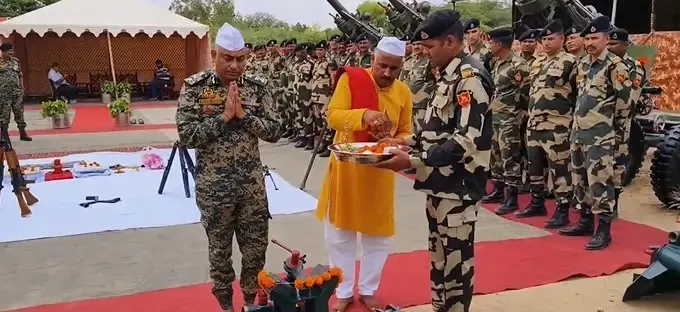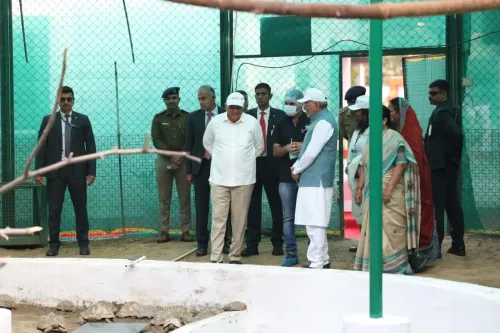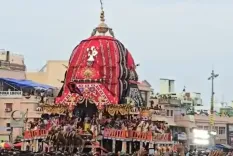Why Did BSF Perform ‘Shastra Puja’ on the India-Pakistan Border in Jaisalmer on Vijayadashami?

Synopsis
Key Takeaways
- BSF's Shastra Puja symbolizes weapon worship and commitment to national security.
- Vijayadashami is a significant cultural festival in India, representing righteousness.
- Operation Sindoor highlights BSF’s operational readiness and coordination with the Indian Army.
- BSF personnel maintain a constant vigil along the India-Pakistan border.
- The observance of traditions strengthens morale and reinforces dedication among soldiers.
Jaisalmer, Oct 2 (NationPress) On the auspicious occasion of Vijayadashami, the Border Security Force (BSF) in Jaisalmer, Rajasthan, conducted the traditional 'Shastra Puja' on Thursday along the India-Pakistan border. This ceremonial worship of arms conveyed a potent message of readiness and determination from the Jaisalmer Artillery Regiment to any potential adversaries.
Vijayadashami, a festival symbolizing the victory of good over evil, is deeply rooted in Indian culture. It commemorates the day when Lord Ram triumphed over the demon king Ravan, representing the conquest of righteousness over wrongdoing. For India’s armed and paramilitary forces, this day is especially significant as it highlights their unwavering commitment to safeguarding the nation from threats.
The day commenced with traditional zeal at the BSF's Artillery Regiment camp, located in the arid landscape of Jaisalmer.
Soldiers, adorned in ceremonial regalia, gathered early to engage in the ritual of weapon worship. The ceremony began with the invocation of Goddess Durga and her divine protectors, the Yoginis Jaya and Vijaya.
Floral tributes were offered to the artillery, with each weapon, ranging from small arms to heavy artillery, being meticulously cleaned, decorated with turmeric and vermillion tilak, and sanctified using Ganga water.
Accompanied by the chants of hymns and patriotic slogans, soldiers saluted their arms, recognizing them not merely as tools of warfare but as sacred embodiments of Shakti, or divine energy.
Chants including 'Jai Hind', 'Bharat Mata ki Jai', 'BSF Zindabad', and 'Artillery Regiment Amar Rahe' resonated throughout the camp, emphasizing the high morale and preparedness of the force.
Commandant Shakti Singh Tanwar, the leader of the Artillery Regiment, stated, 'This is not just a ritual of weapon worship. In Operation Sindoor, our regiment delivered a decisive response to Pakistan’s hostile actions. We neutralized multiple enemy posts and demonstrated that the BSF is fully capable across all domains.'
Operation Sindoor, a recent security initiative, highlighted the BSF’s collaboration with the Indian Army in countering cross-border infiltration attempts.
According to Tanwar, the regiment worked tirelessly throughout the mission, with soldiers remaining alert without rest for several nights. 'It wasn’t just about pulling the trigger; it was about upholding the nation's sovereignty.'
Jaisalmer, characterized by its vast and arid desert landscape, serves as a crucial frontier for India’s border security. Here, BSF personnel maintain an unwavering watch along the International Border. During Operation Sindoor, soldiers patrolled continuously, often taking positions atop sand dunes to prevent any breach of the border.
'The BSF is not merely a paramilitary force; it is the first line of defense for the country.' Tanwar emphasized.
'Our regiment is consistently upgraded with modern technology, including drones, night-vision cameras, and radar systems. Operation Sindoor proved that we are not just guardians of the border but warriors ready to face any combat scenario.'
The observance of Vijayadashami at the border is not just a religious ceremony but also a reaffirmation of the BSF’s steadfast dedication. It sends a message of strength, vigilance, and patriotism to the nation and its adversaries.










